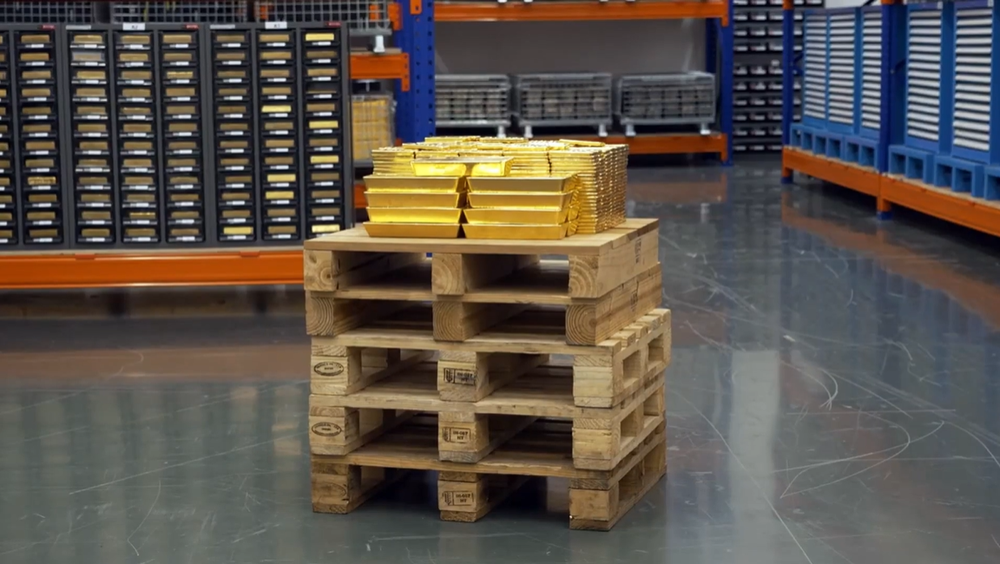Named The Reserve, a new 32-meter-high gold vault has opened in Singapore to meet the needs of super-rich customers for a secure place to store gold.

The Reserve is a six-story vault at Singapore's Changi Airport designed to hold 10,000 tonnes of silver - more than a third of the world's annual silver supply - and 500 tonnes of gold - about half of the net purchases by central banks around the world last year.
Silver Bullion Pte Ltd. built this 16,700-square-meter gold vault, one of the largest in the world, after the company’s previous vault ran out of space. Despite being newly opened, the new vault has already received great interest from customers.
It is a big investment in gold’s long-term prospects at a time when gold prices set an all-time record above $2,500 an ounce just last week, along with strong demand for gold coins and bars from Asian wealth management offices.
According to data from the World Gold Council, the amount of gold purchased on the OTC market, where buyers maintain privacy and secrecy, and is favored by ultra-rich individual investors, sovereign wealth funds and hedge funds, reached 450 tonnes last year and is forecast to continue to increase this year.
Driving demand for gold are rising geopolitical risks, central banks' net buying of gold and demand from Chinese buyers.
While the sharp rise in prices in the second quarter of 2024 has puzzled many observers, despite higher Treasury yields and a stronger US dollar, the macro backdrop is now more supportive due to growing expectations for a shift towards monetary easing by the US Federal Reserve (Fed).
Holding physical gold has disadvantages such as not bringing in profits and having to pay storage costs. But in return, this is a safe asset, helping investors preserve value in volatile economic and political environments.
Investors, including high-net-worth individuals, are looking to reduce the risk of their assets, and gold is one of the few assets that allows them to store value without counterparty risk, said Jeff Christian, a fund manager at CPM Group.
Since the COVID-19 pandemic, privacy and direct visibility of assets have become major concerns for wealthy investors, according to a report by JPMorgan Chase.
For this reason, investors have reduced their demand for holding gold certificates in exchange-traded funds (ETFs), which are one of the easiest ways to invest in gold but lack privacy and anonymity.
As a result, gold ETF holdings have fallen by nearly 900 tonnes since their peak in 2020, while silver ETF holdings have fallen by around 9,500 tonnes since 2021.
As gold flows out of ETF vaults and investors shift to holding gold directly, demand for highly secure locations to store gold has also increased. Investors want to keep their precious metals in separate locations, away from financial institutions, for peace of mind.
Most Western-based banks are subject to foreign laws that may not be very friendly to investors from other countries depositing gold with these banks.
The two largest gold vaults in the world today are those of the New York Federal Reserve and the Bank of England (BoE). Both central banks hold gold for many other central banks.
The New York Fed holds 6,331 tonnes of gold, while the BoE's gold vault in London held 5,266 tonnes of gold at the end of July.
In addition, banks and logistics companies such as JPMorgan Chase, HSBC, Brink's Co. and Malca-Amit also have large gold storage facilities to serve derivatives markets in London and New York, as well as hold gold for the world's largest gold ETFs.
For example, JPMorgan Chase opened a new silver vault in London in 2021, and it now holds more than 10,000 tonnes of silver for the world's largest silver ETF, the iShares Silver Trust.
There are currently many non-bank gold vaults being built around the world, especially in Singapore. With its stable and neutral political system, the "lion island" has become a global asset management center.
Singapore’s status has been boosted after Switzerland’s reputation as a safe haven was dented by the emergency takeover of Credit Suisse last year. But it’s not just Singapore’s gold vaults that have benefited.
The New Zealand Vault in New Zealand's capital Wellington has seen an increase in the amount of gold stored there, mainly from wealth management offices in the Hong Kong Special Administrative Region (China) and the United States.
Mr. John Mulvey, CEO and owner of the gold vault, said that one of New Zealand's advantages is that the country is far from the world's "hot spots", thereby becoming a safe haven.
TB (according to VNA)